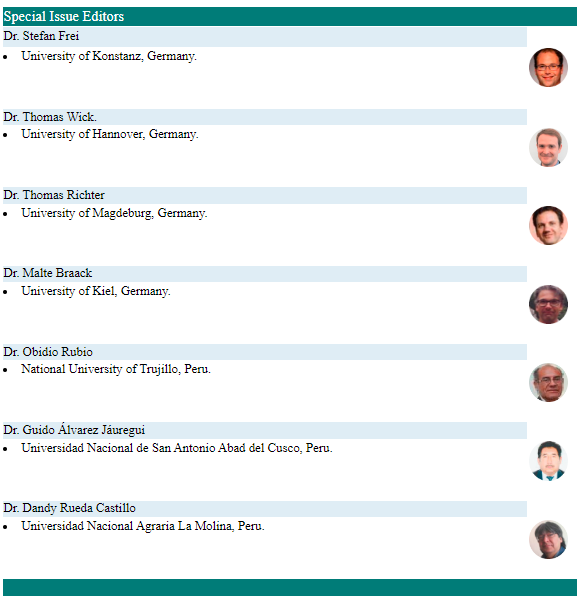A positively invariant attracting set for a predator-prey model with a non-differentiable functional response
DOI:
https://doi.org/10.17268/sel.mat.2022.02.02Palavras-chave:
predator-prey model, invariant set, functional response.Resumo
In this work, the ecologically well-posedness of a predator-prey model is demonstrated by showing that a region of the first quadrant is a positively invariant attracting set for the solutions of that model. The predator-prey model considers logistic-type growth in both populations and a non-differentiable functional response that generalizes previous ones. Due to non-differentiability, there is no uniqueness of solutions, and the standard methodology cannot be applied directly. Topological equivalences, geometrical arguments, and the Poincare-Bendixson theorem are used to obtain our result.
Referências
Rosenzweig ML. Paradox of enrichment: destabilization of exploitation ecosystems in ecological time. Science. 1971;171(3969):385–387.
Cobb CW, Douglas PH. A theory of production. Papers and Proccedings of the Fortieth Annual Meeting of the American Economic Association. 1928;18(1):139–165.
Clark CW. Mathematical Bioeconomics: The Optimal Management of Renewable Resources (2nd edition). Wiley, New York; 1990.
Freedman H. Stability analysis of a predator–prey system with mutual interference and density–dependent death rates. Bulletin of Mathematical Biology. 1979;41(1):67–78.
González-Olivares E, Sáez E, Stange E, Szanto I. Topological Description of a Non-Differentiable Bioeconomics Model. Rocky Mountain Journal of Mathematics. 2005 08;35:1133–1155.
Leslie P, Gower J. The properties of a stochastic model for the predator-prey type of interaction between two species. Biometrika. 1960;47(3/4):219–234.
Aziz-Alaoui M, Okiye MD. Boundedness and global stability for a predator-prey model with modified Leslie–Gower and Holling–type II schemes. Applied Mathematics Letters. 2003;16(7):1069–1075.
Díaz-Avalos JD, González-Olivares E. A class of predator-prey models with a non-differentiable functional response. In:Vigo- Aguiar J, editor. Proceedings of the 17th International Conference on Computational and Mathematical Methods in Science and Engineering, CMMSE 2017. vol. 3; 2017. p. 765–776.
Rivera-Estay V, González-Olivares E, Rojas-Palma A, Vilches-Ponce K. Dynamics of a class of Leslie-Gower predation models with a non-differentiable functional response. In: Dutta H, Peters J, editors. Applied Mathematical Analysis: Theory, Methods, and Applications, Studies in Systems, Decision and Control. vol. 117; 2020. p. 433–457.
Downloads
Publicado
Como Citar
Edição
Seção
Licença
Copyright (c) 2022 Selecciones Matemáticas

Este trabalho está licenciado sob uma licença Creative Commons Attribution 4.0 International License.
Os autores que publicam nesta revista aceitam as seguintes condições:
Os autores mantêm os direitos autorais e atribuem à revista o direito da primeira publicação, com o trabalho registrado com a licença de atribuição Creative Commons Atribución 4.0 Internacional (CC BY 4.0), que permite que terceiros usem o material publicado sempre que mencionarem a autoria do trabalho e os direitos autorais. Primeira publicação nesta revista.
Os autores podem fazer outros acordos contratuais independentes e adicionais para a distribuição não exclusiva da versão do artigo publicada nesta revista (por exemplo, incluí-la em um repositório institucional ou publicá-la em um livro), desde que afirme claramente que o trabalho Foi publicado nesta revista.
É permitido e recomendado aos autores que publiquem seus trabalhos na Internet (por exemplo, em páginas institucionais ou pessoais) antes e durante o processo de revisão e publicação, pois isso pode levar a trocas produtivas e a uma disseminação maior e mais rápida do trabalho. publicado (Consultar: efeito do acesso aberto).












